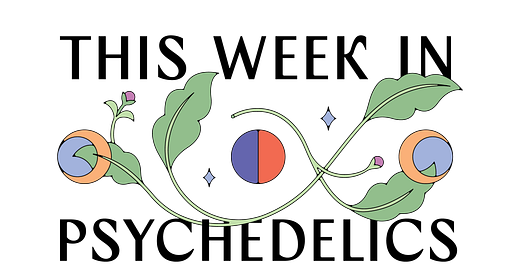Hallucinogen use on the rise in the U.S., Does adding MDMA to psilocybin or LSD result in fewer bad trips? And Cybin acquires Small Pharma
Plus: Indigenous psychedelics coalition in Colorado calls for reciprocity and respect, and more state news
Happy Friday, and welcome back to The Microdose, an independent journalism newsletter brought to you by the U.C. Berkeley Center for the Science of Psychedelics.
Government survey reports hallucinogen use on the rise in the U.S.
According to new results from the National Institute on Drug Abuse’s Monitoring the Future study, hallucinogen use has increased over the last decade, with use among adults between 35 to 50 reaching an historical high. Respondents reported using hallucinogens including LSD, MDMA, mescaline, and psilocybin.
The survey began in 1975 by polling 8th, 10th, and 12th grade students, then following a subset of graduating students into adulthood. The study now includes over 110,000 individuals, some 28,500 of which are surveyed each year. In 2022, 8 percent of young adults between 19 and 30 years old reported using hallucinogens, compared with 3.4 percent in 2012. Just over 4 percent of adult respondents between age 35 to 50 reported having used hallucinogens, the highest rate since the survey began tracking that age group in 2008. (For comparison, just 0.5 percent of adult respondents said they’d used hallucinogens when surveyed in 2012.)

Does adding MDMA to psilocybin or LSD result in fewer bad trips?
Bad trips happen — but according to a new study published in Scientific Reports, people who took MDMA alongside psilocybin or LSD were less likely to undergo such challenging experiences. Researchers at the New York University Langone Center for Psychedelic Medicine and Imperial College London’s Centre for Psychedelic Research surveyed nearly 700 people who planned to use LSD or psilocybin and then gave the respondents questionnaires after their trips to assess how things went for them. Of the 700 participants, 27 used MDMA with LSD or psilocybin, practices known among psychonauts as “candy-flipping” or “hippie-flipping,” respectively.
Participants who reported co-use were less likely to have challenging experiences like grief and fear and they reported higher levels of self-compassion, love, and gratitude. Given the study’s small sample size and its inability to determine causation, the researchers say more research is needed to determine the relationship between co-use and psychedelics users’ experiences.
Want the latest psychedelics news? Subscribe! (It’s free!)
Cybin acquires Small Pharma
On Monday, British biotech company Small Pharma announced that it would be acquired by Cybin, a Canadian biotech company. Both companies have worked to develop mental health treatments using DMT. According to a press release, the combined intellectual property portfolio between the two companies includes 158 pending patent applications and 28 granted patents. The aim of the merger is to create the largest catalog of psychedelics-related patents.
In January 2023, Small Pharma reported preliminary results from a phase 2a clinical trial using SPL026, the company’s intravenously-administered synthetic DMT, to treat major depressive disorder. But given its recent financials, “it’s clear that Small Pharma’s runway is dwindling,” Psychedelic Alpha wrote in its analysis of the acquisition.
Indigenous psychedelics coalition in Colorado calls for reciprocity and respect
As Colorado begins to implement its Natural Medicine Health Act, the ballot initiative voters passed in November 2022, which will establish psilocybin services in the state, a group called the Native Coalition of Colorado told The Denver Post that they’re concerned that the measure could make it more difficult for Indigenous communities to practice their traditions. While the ballot initiative’s campaign organizers and Colorado’s Department of Regulatory Agencies say they’ve tried to include Native communities in their planning, some members of the Indigenous coalition told the newspaper it isn’t enough.
The State of Psychedelics: Hawaii’s task force assembles, Colorado announces psychedelics listening tour
In Hawaii, a new psychedelics task force established by the state’s Office of the Governor met for the first time this Tuesday. According to the state’s press release, the Breakthrough Therapies Task Force “aims to assist the state in expanding therapeutic access to two key substances: MDMA and psilocybin.” Members include two state senators who supported a stalled bill proposing that the state establish a psychedelics task force, the Hawaii Department of Health’s chief policy officer, and experts in psychiatry, harm reduction, integration, and public safety.
Colorado’s newly-established Natural Medicine Division announced a series of listening sessions. Over the next month, the division will host meetings to discuss topics including public education, testing psilocybin, and cultivation practices.
MAPS is leading an initiative to study MDMA’s potential to treat PTSD in countries at war — but the organization has financial, regulatory, and ethical hurdles to clear in its home country before it’s clear how successful those programs can be, reports Jonathan Moens in Undark.
Reason Magazine interviewed former Texas governor Rick Perry at this year’s Psychedelic Science 2023, where he spoke with them about his views on psychedelic-assisted therapy (he’s anti-legalization, and wants to see slow and methodical research and roll-out of such therapies), and his interest in potentially trying ibogaine in the hope that it could improve his executive function and help treat the effects of previous concussions.
In The Oregonian’s op-ed section, readers are sparring over the state’s psilocybin services program.
You’re all caught up! Have a great weekend. We’re taking Labor Day off, but we’ll be back in your inbox next Friday with a fresh issue of This Week in Psychedelics.
If you know anyone who might like the latest on psychedelics in their inbox, feel free to forward this to them, or click below.
Got tips? Email us at themicrodose@berkeley.edu.







I'm thrilled there's research being done on using MDMA with classical psychedelics.